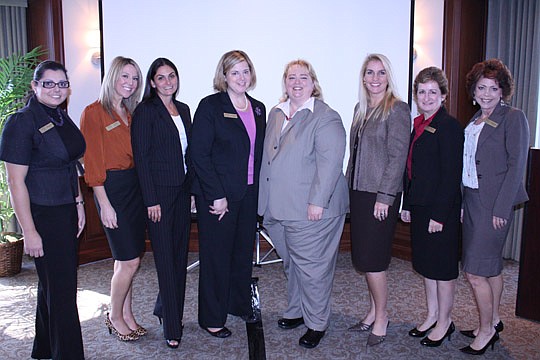
Social media use can lead to potential ethical problems for attorneys and their clients, as attorneys and guests of the Jacksonville Women Lawyers Association learned Thursday.
Holland & Knight partner Jennifer Mansfield practices in media law and she discussed how social networking sites and blogging could present problems.
“The theme that permeates this whole area of legal implications of social media in general is that people do things in the social media context that they would never do in real life, person-to-person. Yet, they let their guard down and they are not thinking and suddenly they find themselves in trouble,” said Mansfield.
The popularity of social networking sites Facebook and Twitter could be a problem for those applying to The Florida Bar because its Board of Bar Examiners has the ability to review the content of applicants’ pages at those sites.
“People don’t pay attention. That’s the point; we’ve got to pay more attention. We’ve got to think before we rattle off that response on Facebook or Myspace or text your buddy. Cyberspace can get you in just as much hot water as a written letter or oral communication,” said Mansfield.
The initial reaction might be to shut down social media accounts, but that also could cause trouble, Mansfield warned.
“You need to be advising your client ethically on how to deal with these emerging issues of what is available in the discovery process,” said Mansfield.
She cited the case of Romano v. Steelcase Inc., a personal injury case in New York that involved Kathleen Romano suing Steelcase Inc. after she fell out of her office chair and claimed she suffered permanent injuries as a result of the incident.
Steelcase pursued access to Romano’s Facebook and MySpace pages because they contained images of Romano showing she had not suffered permanent injury. The Supreme Court of Suffolk County granted the access.
Mansfield also explained the importance of informing a client that there is an attorney-client privilege when discussing their case, and they may lose that privilege if they communicate information about the case.
“You need to advise your clients, believe it or not, that communications include Facebook, include blogging,” said Mansfield.
“Friending” people on Facebook was another issue she discussed.
Mansfield suggested that attorneys refrain from “friending” judges, other parties if they are represented by counsel and witnesses through a third party.
“Just remember, if I can’t friend that witness or that party, I can’t get a private investigator or someone else to do it on my behalf. I can’t get someone else to do something that I’m otherwise prohibited in doing,” said Mansfield.
She offered a simple process for attorneys to keep themselves out of trouble.
“We need to stop, pause and think, ‘Would I do this in the context different from this?’ Let that be your guiding light on how to get through cyberspace,” said Mansfield.
@photojoe71
356-2466